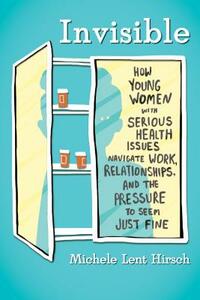Take a photo of a barcode or cover
so freaking important. addresses all kinds of disabilities and all kinds of women, talks about queerness and disability, dating/marriage/children, friendship, doctors not believing you, body image, and all the things that surround women like me and not like me.
emotional
informative
sad
This was helpful. I needed the reminder about mis-perceiving self care as laziness. Also the reminder that it is worth fighting to have my health concerns addressed and taken seriously.
I kind of hate how much I can commiserate and relate to these people's experiences.
While the focus of this book is on cis white women, there are trans and non-binary people, as well as BIPOC people. Race and gender are discussed as well as you would expect from a white queer woman in 2018. It was well written. I'm glad I read it.
Cw: racism, rape, and abuse. There is some discussion of racist experiences, rape, and abuse from doctors that was super upsetting.
I kind of hate how much I can commiserate and relate to these people's experiences.
While the focus of this book is on cis white women, there are trans and non-binary people, as well as BIPOC people. Race and gender are discussed as well as you would expect from a white queer woman in 2018. It was well written. I'm glad I read it.
Cw: racism, rape, and abuse. There is some discussion of racist experiences, rape, and abuse from doctors that was super upsetting.
This was super informative and the narrator was great. I often forgot it wasn't the writer actually narrating because she was so convincing in her tones.
It does kind of jump around because she has a lot of information she wants to share, which can be hard when listening on audio. I also found some parts hard to listen to because I am squeamish and there was a lot of talk about medical procedures. Of course I understand this sort of makes me part of the problem but I can't help but imagine myself being stuck with needles.
It does kind of jump around because she has a lot of information she wants to share, which can be hard when listening on audio. I also found some parts hard to listen to because I am squeamish and there was a lot of talk about medical procedures. Of course I understand this sort of makes me part of the problem but I can't help but imagine myself being stuck with needles.
informative
reflective
fast-paced
Didn’t offer cheap advice. Anecdotes from young women on navigating chronic illness. Some funny, some infuriating, all making me feel a little less alone.
Hirsch's book covers a number of topics that young women of all backgrounds face when they are diagnosed with an illness. There are discussions on careers, relationships, the medical community including research, interactions with medical professionals, how society and pop culture contribute to stigma and stereotypes of those with chronic illness(es) and disabilities, and the big question, in truth, all women face: whether or not to have children. A lot of research went into this book but it is far from boring and dry. Hirsch breaks up these facts (which are sometimes depressing mostly because, if you are a young woman with a chronic illness you are far too aware that they exist) with stories from different women that she has interviewed. One of the issues that Hirsch brings up about medical research, other than the fact that scientists don't like to use women (they are "too complicated"), is that there is no diversity in their sample of women (or men for that matter). This is not the case in Hirsch's book which has viewpoints from various ethnic and cultural backgrounds, skin color, sexual orientation, and gender expression.
This book is a must-read for everyone, but particularly if you are in the medical field in any capacity, care about a young woman who happens to have a chronic illness or disability, or are a young woman with an illness or chronic disability. Hirsch, thank you so much for writing a book that had to be written, and Beacon thank you for buying it and getting it out there. Our voices need to be heard!
This book is a must-read for everyone, but particularly if you are in the medical field in any capacity, care about a young woman who happens to have a chronic illness or disability, or are a young woman with an illness or chronic disability. Hirsch, thank you so much for writing a book that had to be written, and Beacon thank you for buying it and getting it out there. Our voices need to be heard!
If I hadn't been reading this in public, I feel like I would have definitely been yelling at least twice a chapter. Not only is this a really good look at the social mechanics of gender and disability, but hearing that so many other people had experiences with navigating medicine that were nearly IDENTICAL to mine made me feel some kind of way. Also I appreciate that she actually seriously talks about how queerness and race complicate things, rather than taking the perspective that white cishet women have universal experiences and maybe throwing a couple of lines out about how it might be different for women of color and queer women. Which, even though Hirsch is Jewish and not straight (not sure of the specifics of her identity), is not a guaranteed thing.
dark
informative
reflective
sad
fast-paced
If you are a woman with a chronic illness and want to feel seen, then you will get something out of this book. Perhaps less so if you are looking for practical tips on how to navigate your feelings and level of activity, as this is mostly filled with accounts of women who have been failed by their doctors, friends, and significant others. Because of that, I HEARTILY recommend that anyone who interacts with chronically ill women should give this book a read. It may be illuminating for you, and it might make you treat the disabled/ill women in your life better. One would hope. Then again, we're unfortunately quite used to being let down.
I do wish this tackled the added complication of fatphobia in the medical profession, as that was a big gap in the otherwise quite diverse interviewed women, but the subject barely comes up. Besides that, while I was knowingly infuriated at times while reading because of my own experiences, I am glad I finally read this.
I do wish this tackled the added complication of fatphobia in the medical profession, as that was a big gap in the otherwise quite diverse interviewed women, but the subject barely comes up. Besides that, while I was knowingly infuriated at times while reading because of my own experiences, I am glad I finally read this.
Graphic: Chronic illness, Sexual assault, Medical trauma, Sexual harassment
Moderate: Homophobia, Mental illness, Transphobia
The biggest takeaway I got from this book is that women still have a long way to go to being taken seriously. Scratch that. The world has a long way to go to take women seriously. Sexism and misogyny are so ingrained in our culture, that men and women are not believing women when they say "I am sick. I am hurting. I am in pain." I've experienced doctors minimizing my symptoms for 10+ years. It's not just physical pain, though. It's depression, anxiety, sexual assault, and domestic violence. "Men's issues are real and true and matter. Women's are just made up for attention or for sympathy or to convict an innocent man because women are malicious." I mean, isn't that what we're saying when we don't take women seriously? If what they say isn't true, then women are vindictive, angry liars. An entire gender, stereotyped and dismissed, for what? It starts with us. It starts with us looking around at our community and believing what women say. It takes looking inside ourselves and believing what we ourselves have denied because others told us we were wrong. We must no longer tolerate a world of gas-lighting. My pain is real and I speak the truth. Thanks to Michele Hirsch for highlighting many women who speak the truth.
3.5
Imagine for a moment a book detailing dozens of accounts of homophobia or racism without ever using the words homophobia or racism. That's what Michele Lent Hirsch does in Invisible. Story after story of the discrimination and oppression that sick and disabled women experience at home, work, and in their relationships, proving again and again that we exist and our experiences matter, but never naming ableism—what it is, why it exists, how it impacts those who are and are not sick/disabled, etc. When systems of oppression are not named, they get to stay invisible (pun intended) and we lose opportunities to better understand why things are the way they are and what we can do to change them.
Hirsch did a really good job of ensuring the stories she presented included women from diverse racial backgrounds and sexual orientations. I would have loved to hear a bit more from trans women, although their voices were certainly were not absent. As another reviewer has mentioned, the experiences of fat women were completely absent in this book, despite their unique experiences of discrimination for being both ill/disabled and "overweight" (ableism and fatphobia plus any other marginalized identity). Also, Hirsch's focus on acute illnesses like cancer meant the voices of those with long-term disabling chronic conditions (Fibromyalgia gets one or two mentions for example), were not well represented. Our experiences in work and relationships are often different and it was disappointing to be feel excluded in this way.
I can see how validating a book like this would be to those who feel alone and are looking for/needing validation, as well as those who doubt the severity of systemic ableism and need to be educated about our experiences and what the research shows. I will recommend it to these groups, as despite my issues with the book, it's an important contribution to the growing literature on illness and disability.
Imagine for a moment a book detailing dozens of accounts of homophobia or racism without ever using the words homophobia or racism. That's what Michele Lent Hirsch does in Invisible. Story after story of the discrimination and oppression that sick and disabled women experience at home, work, and in their relationships, proving again and again that we exist and our experiences matter, but never naming ableism—what it is, why it exists, how it impacts those who are and are not sick/disabled, etc. When systems of oppression are not named, they get to stay invisible (pun intended) and we lose opportunities to better understand why things are the way they are and what we can do to change them.
Hirsch did a really good job of ensuring the stories she presented included women from diverse racial backgrounds and sexual orientations. I would have loved to hear a bit more from trans women, although their voices were certainly were not absent. As another reviewer has mentioned, the experiences of fat women were completely absent in this book, despite their unique experiences of discrimination for being both ill/disabled and "overweight" (ableism and fatphobia plus any other marginalized identity). Also, Hirsch's focus on acute illnesses like cancer meant the voices of those with long-term disabling chronic conditions (Fibromyalgia gets one or two mentions for example), were not well represented. Our experiences in work and relationships are often different and it was disappointing to be feel excluded in this way.
I can see how validating a book like this would be to those who feel alone and are looking for/needing validation, as well as those who doubt the severity of systemic ableism and need to be educated about our experiences and what the research shows. I will recommend it to these groups, as despite my issues with the book, it's an important contribution to the growing literature on illness and disability.




